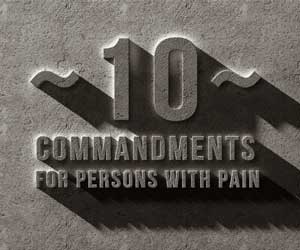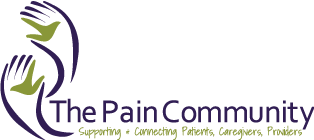 Thou shalt communicate with thy health care providers
Thou shalt communicate with thy health care providers
- Tell them the location and intensity of your pain
- Describe what impact your pain has on your overall quality of life and everyday functioning: quality of sleep, activities of daily living, household chores, job related activities, recreation and socializing with others especially your loved ones.
- Thou shalt remember that pain relief is like a 3-legged stool (Mind + Body + Spirit) and you must have all three for balance.
- Thou shalt be willing to trial pain relief treatment options for about a month (or more) before abandoning them.
- Seek a combination of treatment options that treat ALL of you.
- Some treatment options have a “building up” effect meaning they work better over time.
- Some treatment interventions require upward/downward adjustments (tweaking) to reach the most benefit.
- Thou shalt set goals that inspire you—ones you can reach over time.
- What are your dreams and wishes for improved activity, therapy, and life?
- Thou shalt work to improve your emotional well-being, behavior and coping skills.
- Remember, recognizing and asking for help, such as counseling or coaching is a sign of strength and courage.
- Recognize that your thoughts shape your experience. Your brain believes what you tell it!
- Practice self-compassion and give yourself a break!
- Thou shalt protect and respect the quality of thy sleep whenever possible.
- Quality sleep is healing and helps lessen pain; knowing when to take a rest break, a nap or retire at the end of your day is golden.
- Thou shalt remember that pain is a personal and individual experience thus unique to you as well as to others, who live with pain,
- Since the pain experience (how it feels, where it is located, how it reacts to treatment) is different, what may work well for you may or may not help your friend, family member or acquaintance. The reverse is also true.
- Thou shalt take your medications exactly as prescribed and NOT change the dose (take more or less) without asking your health care provider who prescribed the medication first.
- Thou shalt keep your pain medications in a safe, secured place—out of reach from children, pets, and those who may steal them (this could be friends, family members or workers in your home).
- Thou shalt keep thy neighbor safe and not share thy prescription pain medications (or any prescribed medication) with them.
- What has been prescribed for you for your specific pain or other health issues may be dangerous for another person even if their symptoms seem to be the same as yours.
 Thou shalt communicate with thy health care providers
Thou shalt communicate with thy health care providers

Wow This is so not teh 10 Commandments. This is so touchy feely, who runs this site and have you ever experienced level 10+++++ pain 24/7?
Most of the leaders and members of TPC live with pain—persistent pain—most for many years. So the answer to your question is “yes”. At TPC, we understand, we care, we listen and we strive to help others with pain live a quality life the best that each individual is able. Allie, please share which one or ones you take issue with and why. I really wish to know.